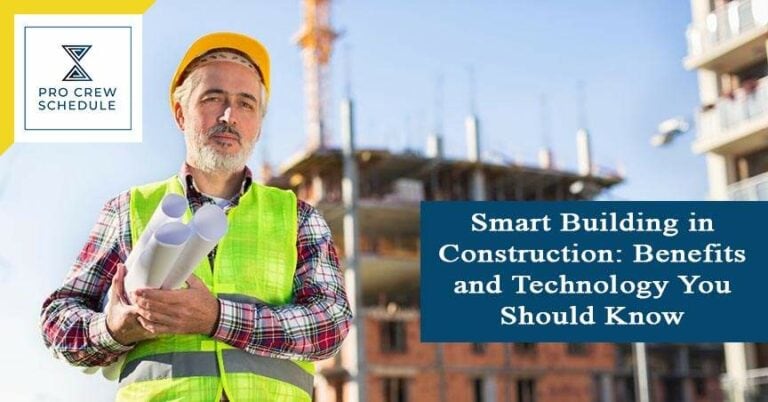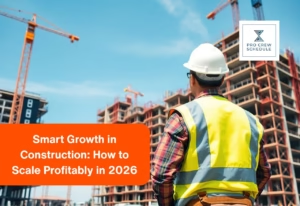There is no denying that we are surrounded by technology, which is prevalent for all industries— especially construction. We use it every day in our personal and professional lives. Since we live in the 4th Industrial Revolution, all aspects of routine are in the process of digitizing and becoming smart— even the buildings we construct and the homes we live in. Smart building is a fast emerging and fresh trend in the construction industry, and professionals are urgently encouraged to give it a shot.
In today’s blog, we will present you with the key benefits that smart building brings to your business and the upcoming innovative technology you can expect to fill the spotlight in the construction industry in the years to come.
What Is A Smart Building?
Before anything else, let’s start with the definition of this technology. Smart building is a currently emerging construction trend all over the world. It is gaining popularity in various buildings, from offices to factories, from commercial to residential, and even healthcare facilities to hospitals. Moreover, according to the Smart Buildings Report by Markets and Markets, this construction trend is expected to grow twice as much by 2025.
The main factor in this growth is raising awareness of the need for a more sustainable solution in space utilization and improving traditional construction operations in general.
Building smart structures must include technology that controls, connects, and automate all aspects of the building, cutting cost, increasing efficiency, and promoting a more sustainable environment. Such a building must contain a series of technological tools and improvements, but what is more essential is that it has to connect all the systems inside in a dynamic approach, providing a smooth and fast flow of information.
Can You Turn Old Building into a Smart One?
Now, you might think— is smart building only applicable to new construction with innovative designs and systems? While it is true that the use of this construction technology is more connected and relevant to modern structures, the buildings of old won’t be left out of the picture. However, since buildings are responsible for a high percentage of energy consumption in our environment, the need to innovate them is also increasing.
The good news is, it is not impossible to incorporate new technology into old buildings— it only requires appropriate guidelines to follow and enough financial resources.
What are the Benefits of Smart Building?
1. Saves Energy
One of the vital benefits of an intelligent building is low energy consumption, which translates to lower expenses for your construction business. Now, how is this done specifically? Technology can monitor the lighting, water distribution, and HVAC system of a particular building. Different kinds of smart sensors that you can use in your building can also provide detailed information if something is broken, reducing the chances of delays in the timeline and cutting downtime for repairs.
2. Boosts Productivity
Technology and tools that provide fast, real-time information about a structure significantly improve a construction team’s productivity and efficiency. For instance, with the help of a tool that can monitor rooms, you can better manage the meeting room schedules and hot desk situations during your regular coordination meetings. This technology installed inside the building can give you updated data and information, reducing meeting preparation time which you can use to do more urgent tasks.
3. Increase Well-Being
As we all know, technology is made to enhance the way we live— and it can even improve the well-being of its users. Good air-conditioning, lighting, and proper ventilation are common factors that an intelligent building can manage.
4. Green and Sustainable
Last but not least, let’s highlight the one factor that makes smart buildings known in the construction industry— its sustainability. In the current times, we can see the rise in the popularity of environment-friendly solutions in construction, which is caused by an urgent need to reduce the carbon footprint in our economy caused by global warming.
One way to lessen this is through modern technology. Minor changes such as monitoring the temperature inside a building and tracking the energy consumption and water usage can dramatically help the planet and construction companies.
What is the Upcoming Smart Building Technology?
Now that we’re done discussing the definition and benefits that smart building can bring to your company, let us focus on the standard technology used in the current times:
1. Internet of Things (IoT)
Perhaps the most popular and essential smart building technology is the Internet of Things or IoT. Basically. It is a system that uses an Internet Protocol (IP) platform that enables connection to multiple devices (such as microchips or sensors) to exchange and analyze data, optimize the device’s controls, and automate tasks. When implemented across an entire building, IoT enables asset digitization throughout, which means immediate improvement inefficiency.
In most instances, IoT-enabled devices are linked and controlled over the internet via a mobile application, providing a user-friendly and convenient experience to those who utilize them. Some of the practical examples you can integrate this into your smart building is by:
- Self-learning thermostats
- Smart water and electrical meters
- Sensor enabled-soap and paper towel dispensers that can re-stock when needed
- Smart restrooms with an alert system that can alert cleaning crews when levels are running low
Related: IoT in Construction and How It’s Reshaping the Industry
2. Artificial Intelligence & Machine Learning
Like IoT, AI or Artificial Intelligence is a buzzword getting attention in the construction industry but is still frequently misunderstood. Generally, AI is a system by which software and machines mimic human intelligence and behavior, with the ability to acquire and apply knowledge when needed. This automation of decision-making power within machines or software means carrying out tasks without required human supervision. You can implement AI in your smart building through the following:
– An IoT and AI asset management system can pick up abnormalities in asset workflows- like a leaking refrigerator, for instance, based on the information it acquired about the machine’s output when functioning normally or from its regular energy intake.
– AI-enabled automation software can predict maintenance, review, and approve work orders, with little to no human intervention needed.
3. Aerial Drones
Against common human knowledge, drones are not only valuable for delivering packages, monitoring job site operations, or taking aerial photographs— they can also be used in retail spaces or inside a commercial building to provide intelligent support, automating time-consuming tasks, and providing employees more time to focus on the most urgent tasks on-site. Also known as “unmanned aerial vehicles, drones may also employ AI to operate independently and even remotely. Moreover, drones are agile, cost-effective, and relatively easy to deploy anywhere.
Some of the functions drones can implement to various kinds of structures are the following:
- Detecting intruders on a construction job site or office
- Inspecting hard-to-reach areas, such as rooftops
- Scanning warehouses for placement of building materials, equipment, or tools
- Additional set of eyes that detect on-site work delays that can function 24/7
Related: Drone Technology in the Construction Industry: Major Impact and Applications
4. Building Information Modeling (BIM)
BIM or Building Information Modeling is a 3D-model-based process that displays the functional and even physical characteristics of a structure. Generally, BIM has primarily been introduced by the AEC professionals in Architecture, Engineering, and Construction, but it has recently become famous within the facilities and construction management context.
BIM is commonly used as a “building handbook,” provides the following features to intelligent buildings:
- Enables accessibility to asset profiles and improves asset allocation in the construction operations.
- Beyond the geographic information aspect, it provides valuable insights on light analysis, spatial awareness, and properties of building components.
Related: 12 Ways BIM is Improving Construction Project Management
5. Augmented Reality (AR) and Virtual Reality (VR)
Augmented Reality or AR is an alive, copied perspective of a real-world environment in which elements are supplemented through computer-generated sensory input. Usually involving a camera or any viewing device, like a smartphone, tablet, or eyeglasses, AR superimposed non-real objects onto a view of a person’s real and physical surroundings.
On the other hand, virtual reality, or VR, takes computer-generated sensors further by creating a fully immersive experience by shutting out the real world and transporting the viewer into a virtual but still realistic environment.
These two technologies have the design and operation sides of construction by:
– Creating VR mock-up for project owners to experience the proposed structure as if truly entering the space, where a client can get a feel of the finished construction even before anything materializes.
Related: Visualizing the Future of Construction Industry with VR and AR Technology
Smart Building: Step into Automation and Innovation
You already know that modernizing old buildings with smart technology is possible, but did you know that construction building processes can be smart too? Smart devices and systems are widely used in construction since they can improve productivity, work quality, and output.
One sure-fire technology is construction scheduling software, such as Pro Crew Schedule, which allows you to control and manage construction works in one place. Typically, it takes information from everyone in the construction team, gathering all the data in one place, so it would be easy to see the birds-eye view of the construction in general. Thanks to the lack of delays and unnecessary energy usage, the environment can also benefit from its power to minimize cost and maximize productivity.
Subscribe to our blog to be updated with the current news, trends, and tips from the construction world. We are happy to have you here.







